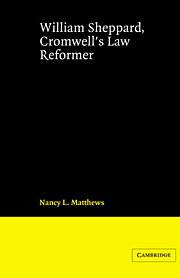Book contents
- Frontmatter
- Contents
- Preface
- Notes on Style and on Bibliography
- Abbreviations
- Introduction
- 1 Biography
- 2 Early Legal Works, 1641–1654
- 3 The Protectorate Period, 1654–1659
- 4 England's balme
- 5 Later Contributions to Legal Literature, 1660–1674
- 6 Conclusion
- Bibliographical Comment
- Chronological Bibliography of Sheppard's Books
- Sheppard's Sources
- Index
- CAMBRIDGE STUDIES IN ENGLISH LEGAL HISTORY
3 - The Protectorate Period, 1654–1659
Published online by Cambridge University Press: 28 October 2009
- Frontmatter
- Contents
- Preface
- Notes on Style and on Bibliography
- Abbreviations
- Introduction
- 1 Biography
- 2 Early Legal Works, 1641–1654
- 3 The Protectorate Period, 1654–1659
- 4 England's balme
- 5 Later Contributions to Legal Literature, 1660–1674
- 6 Conclusion
- Bibliographical Comment
- Chronological Bibliography of Sheppard's Books
- Sheppard's Sources
- Index
- CAMBRIDGE STUDIES IN ENGLISH LEGAL HISTORY
Summary
So that the law that was instituted for the quiet and defense of man is now by corruption abused to his vexation, charge and offense. I cannot say but woe and alas, that we are so miserably fallen and degenerated. And taking notice further that there is at this time upon the spirit of our present authority a deep sense of this and some other evils and pressures upon the nation; with a resolution, as far and as fast as it can, to cure them, if we ourselves do not obstruct it.
County judicatures (1656), sigs. A3v–4rAnd calling to mind the excellent invention of our common law (observed by an eminent judge of the nation, Coke Second Institute, fol. 311) that men should not be troubled for suits of small value in the great and remote courts of the nation, but that they might be heard and determined in the country, with small charge and little or no travel, it ordained county judicatures.
County judicatures (1656), sig. A2vI have taken the pains here in this work to contrive and make up one great precedent for common assurances by deed in a new and untrodden way and method … the main design and labor thereof to show when a conveyance is good and wherein the defects thereof do lie.
President of presidents (1656), sigs. A2v–3vIn the spring of 1654 Sheppard was called from Gloucestershire to serve the newly established protectorate government at Whitehall. His primary responsibilities were to advise Cromwell on legal matters and to prepare a comprehensive program for the reform of the law. His understanding of his assignment is best described in his own words.
President of presidents (1656), sigs.- Type
- Chapter
- Information
- William Sheppard, Cromwell's Law Reformer , pp. 103 - 143Publisher: Cambridge University PressPrint publication year: 1985

